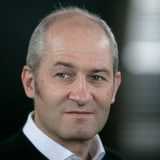The Federal Council has decided to adopt the EU sanctions against Russia. Oliver Diggelmann, a specialist in international law, explains why this does not conflict with Swiss neutrality and how this is to be classified historically.
SRF: With the sanctions that have now been decided, Switzerland is going further than ever before. Agreed?
Oliver Diggelmann: With economic sanctions, yes. This is full solidarity with the EU on a crystal clear case. However, Switzerland has previously participated “passively” in military sanctions imposed by the UN Security Council. For example, by granting overflight rights, as in 1995 during the Yugoslav war.
Do you see this as a paradigm shift with regard to the interpretation of Swiss neutrality?
It’s a striking turning point. Whether this is a long-term change remains to be seen. Because the language of the Federal Council is interesting: it speaks of a “one-off step”. That can mean two things. A unique case or a real innovation. It might go the other way.
It’s a striking turning point. Whether this is a long-term change remains to be seen.
Other neutral countries, such as Sweden, fully adopted the EU’s planned sanctions last week. Does Sweden understand its neutrality differently?
Yes, that’s the way it is. With the exception of Switzerland and, to a certain extent, Austria, most neutral countries have a rather sober and pragmatic attitude towards neutrality. Here in Switzerland, however, neutrality is also an identification feature of the state. It is one of the perhaps not so numerous brackets that hold Switzerland together. We therefore react much more sensitively when we see neutrality affected. And sometimes don’t see the big picture.
With the sanctions, Switzerland is also taking targeted action against individual Russians. That doesn’t sound neutral.
The measures against individuals are part of the package directed against the Russian state and its decision-makers. Today this is done in order to specifically target the elite. In the case of this aggression, however, there is no room, politically or morally, for equating Russians and Ukrainians.
Switzerland is participating in what must actually follow in the case of a clear breach of the most fundamental rule of international law.
Critics complain: With the severe sanctions, Switzerland is taking itself out of the game as a possible mediator in the conflict, because neutrality is being scratched.
That’s one interpretation. But you can also see it this way: Switzerland is participating in what must actually follow in the event of a clear breach of the most fundamental rule of international law. Russia is positioning itself outside of the community of international law and is thus accepting the consequences. This in no way precludes Switzerland from being able to offer good offices at any time. When Switzerland says that, you believe it.
With its combination of neutrality, the second UN seat and unpretentious diplomacy, Switzerland has scope and credibility that others do not have.
What is your assessment: As a mediator, does Switzerland have more to contribute than others – can Swiss diplomacy be particularly in demand?
Yes of course. However, there are other countries that also have particular credibility in this area, such as Canada and Norway. With its combination of neutrality, the second UN seat and unpretentious diplomacy, Switzerland has scope and credibility here that others do not have.
Interviewed by Michael Perricone.
